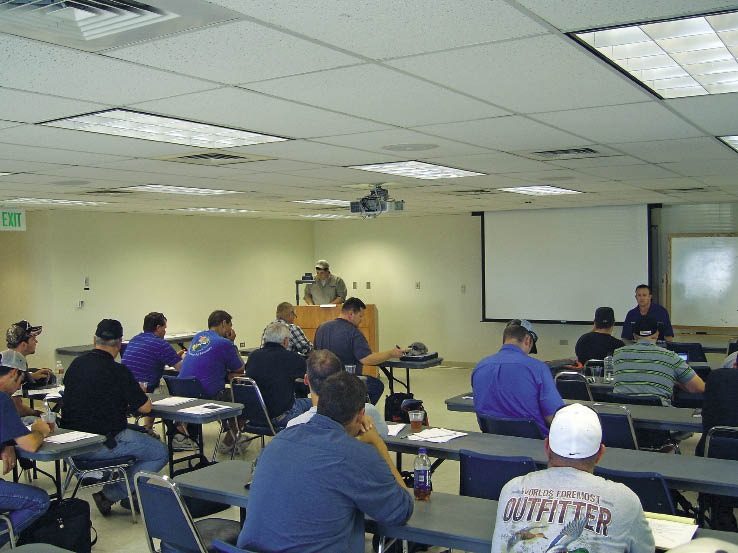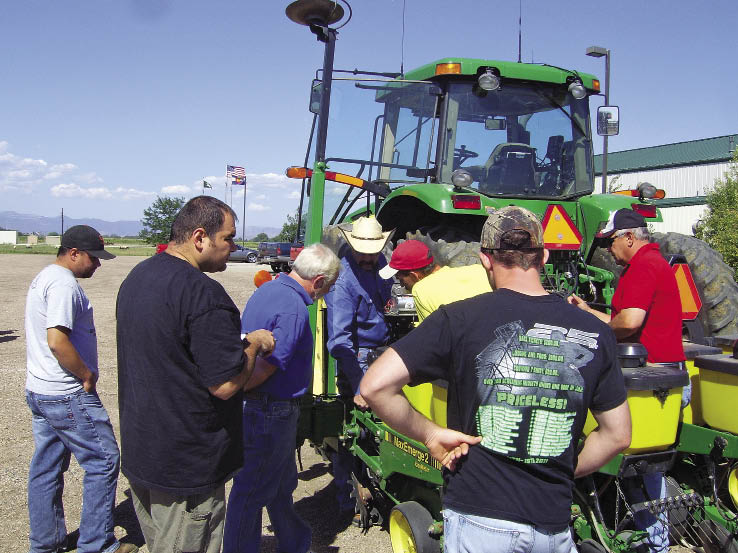When the Precision Agriculture Center opened at West Hills College a decade ago, it was ahead of its time. Back then, while placing students in farm equipment dealerships was the goal, most found jobs as consultants or product experts at manufacturers.
“At most of the equipment dealerships, back then the ‘precision’ jobs turned out to be more like straight technician roles. No one was ready to pay for a guy to focus on precision farming,” says Clint Cowden, ag science and technology instructor for the Coalinga, Calif., community college. “They needed a mechanic who would sometimes troubleshoot a GPS system.”
Times have changed. In order to better serve their customers, farm equipment dealers are shifting their approach to selling and servicing precision farming technology. When the 2012 Farm Equipment Dealer Business Outlook & Trends survey asked dealers if they would be hiring precision farming specialists by the end of the year, nearly 20% said they would.
Now, for a dealership to hire a talented candidate among all of the other opportunities he or she has is becoming the challenge. Farm equipment dealers still compete with agribusinesses, suppliers and farms for students who have a technology background as an aptitude for software and some agronomy. Fortunately, college and university programs are giving students a head start.
“The people we look at who are graduating from college with the right degrees already have had exposure to precision farming,” says Gabe Gantz, precision farming specialist for KanEquip, an eight-store Case IH and New Holland dealership in Kansas.
“And it’s becoming enough of a norm that a lot of the people we look at hiring have been using something similar on the farm and are at least familiar with it. With this background, we’ve found we can bring most people in and send them to some training on the systems we sell, and then get them out in the field and get them going.”
Farm of the Future
Cowden’s “Farm of the Future” program is relatively small, averaging 15 students, but has garnered national attention thanks to partnerships with leading manufacturers such as Topcon Precision Agriculture and because of its curriculum. His courses that are generally hands-on, and the program attracts students with a range of backgrounds.
 Trimble is collaborating with Colorado State Univ.’s Agricultural Research, Development and Education Center (ARDEC), a facility in Fort Collins, Colo. Trimble outfitted ARDEC tractors, implements and other machinery with GPS and additional technologies used for precision agriculture, giving faculty, staff and students daily use of cutting-edge technologies in the classroom and the field. 
|
He says some students fly in from massive farms on their dad’s plane to look at the school, while the father of another prospective student might be out laying irrigation pipe. “After they get here, the industry doesn’t care who their parents are. It’s what can they do that matters. I’ve been happy that our students have found some very good positions in the agricultural industry,” says Cowden.
These days, the jobs for people with precision farming experience seem to be virtually unlimited. “I have two opportunities per student right now,” says Cowden. While companies have more incentive to offer respectable salaries in order to get the right specialist in place, the biggest problem from Cowden’s perspective is “getting a California kid to leave the state. For example, I know of an excellent job in North Dakota. They’ll pay for additional schooling and it pays $45,000 to start. I can’t find a taker. But my students might go to Yuma, Ariz., where it’s 120 degrees in the shade.”
Coalinga’s “Farm of the Future” program is centered at Allen Farm, 215 acres of diversified farmland in the San Joaquin Valley, which was donated to the college in 2001. Courses that make up an associate of science degree or certificate programs in agriculture science and technology give students hands-on exposure to precision farming and agronomic practices in almonds, row crops and irrigation and drainage. GPS equipment operation and maintenance is also offered.
Cowden says the students who enroll in his classes want to get out in the dirt. “My kids will put up with three-hour lectures, but they don’t want to hear how soil has evolved over three centuries. They want to be in the field doing things such as learning to operate and repair precision ag systems.”
There’s no getting around a software discussion in the classroom. “We have to get into file formats and mathematical models of the Earth,” says Cowden. “That’s something we spend a lot time on, and it’s hard to keep some of these guys motivated. They don’t want to spend so much time on the computer. They need to do it now so they understand it when they’re in the field.
“When growers buy tractors today, they expect it to drive straight because of auto-steer. Now these growers are asking, ‘How do I get this equipment to be variable rate?’ We spend quite a bit of time working with students on the software side of things.”
Providing Consistency
The evolution and breadth of the products that make precision farming practices possible are changing the way equipment dealers are getting trained on the technology, and much of that is driven by the farmers themselves.
“Precision farming training used to be all about auto-steer, but now almost everyone has a guidance system,” says Wade Stewart, training manager for Trimble Navigation’s Agricultural Div. “Now, farmers want to know what else they can do with it. Precison ag instruction is moving toward working more with variable rate and section control.”
Last August, Trimble announced it was collaborating with Colorado State Univ.’s Agricultural Research, Development and Education Center (ARDEC), a facility in Fort Collins, Colo., that’s focused on livestock and crop production.
As part of the collaboration, Trimble outfitted ARDEC tractors, implements and other machinery with GPS and additional technologies used for precision agriculture, giving faculty, staff and students daily use of the cutting-edge technologies.
Trimble, in turn, uses ARDEC as a training center for dealers. The biggest advantage to us,” says Stewart, “is we’re not just setting the equipment up for a one-day demonstration, as it’s in the field working every day. Resellers get to see what it’s going to look like when it’s on their customers’ farms.”
Stewart says when training programs were moved to different locations, it was often difficult to find the right equipment and location to operate the machines. The equipment was always different, and the consistency in the training would wane because we could have a different set up every time. This gives us a more structured approach.”
Plus, because the precision farming solutions are being used by CSU on a daily basis, at least one example of every Trimble solution is available for demonstration at any given time.
“Classes can receive training on the entire product line,” says Stewart, “even our newest precision ag solutions like Connected Farm.”
CSU raises corn, wheat, barley, sunflowers, alfalfa, dry beans and specialty crops on nearly 800 acres at the ARDEC facility, located north of Fort Collins. Trimble, headquartered in Sunnyvale, Calif., has an office in Westminster, Colo., the primary location for its precision farming operations.
Gantz is focused on supporting precision farming at KanEquip, and the dealership recently started an initiative to hire more people to support the equipment. As the dealership’s precision farming department grows, Gantz says traveling to a dedicated training site makes sense. “It’s more valuable to send one or two people to training then pulling the entire staff together if they come to us. We would like our employees to all be in one spot at our store, and we’ve done that in the past. But now, when we have someone new join the dealership, we can send them out for training and not make everyone sit through the classes again.”
Another advantage of traveling to a dedicated training facility is it puts students in a learning environment. When sales people and technicians step into a meeting room at their dealership location, there are calls and other day-to-day business that keep them distracted. The employee is already spending time away from their department. Being isolated from the business for a couple days can help reinforce the learning experience.
Hands-on Experience
In Colorado, the workshops are built around consistency and repetition. “The more times you see and do something, the better you’ll understand it,” says Stewart. “We don’t do more than two hours in the classroom and the rest of the time is out in the field or in the shop installing kits and harnesses.”
Students don’t enter into the agricultural industry because they want to sit behind a computer. They want real world experiences. “In this business, hands-on training is by far the best. We need to get out there and mess with it. That’s how you learn this stuff,” says Gantz. “I think it’s a good idea to dedicate one central training center, much like many companies are doing in the agricultural field.”
While there are advantages to holding training in a dedicated learning center, many precision farming suppliers are still willing to travel to dealerships. For Raven Industries, dealers can submit a request through their territory sales representative. “We can’t honor all requests, but we travel to their location to provide training. We would much rather have them come to our facility,” says Troy Coatsworth, service and reliability manager for the Sioux Falls, S.D., company.
Raven is building a $2 million addition on to its existing training facility at its Innovation Campus north of Sioux Falls, which will have room for up to 70 students in a state-of-the-art classroom as well as ample room for hands-on work.
“The first training Raven offered more than a decade ago was pretty much all PowerPoint presentations, and you know how much everyone enjoys that,” says Coatsworth. “People learn by touching and pushing buttons, flipping switches, turning wrenches and getting their hands dirty. We tell students to wear old clothes because they’ll be getting dirty.”
The fact that students need to be told they may get dirty working around farm equipment may be one of the biggest differences between the average student today and the typical farm kid. “The trend I see is toward younger, more tech-inclined students who are willing to turn wrenches, but are more inclined to sit in front of a computer,” says Coatsworth.
In Coalinga, Cowden says a change he’s noticed over the past decade is that students don’t have the mechanical background they used to. “We find ourselves having to teach the basics of welding and hydraulics in the classroom. We have to teach them the mechanical side in case the equipment they’re working on doesn’t have the latest electronics. Some students want to pick and choose from the curriculum, but this is all part of precision farming. Employers are looking for the student who understands software and who can turn a wrench.”
The technology is changing rapidly, so training must be an on-going part of a dealership’s schedule. “You must have someone attend a training course every year to keep up with the new products,” says Gantz. “We have had at least one person at each one of the training sessions since Trimble began the program in Colorado. It’s valuable for us to send someone new to the dealership so we can have them get training and we can get rolling. We all benefit from what they learn.”
Coatsworth says students who go through training at Raven range from industry veterans to a new guy right out of college who’s just started working with an equipment dealer. There are also field service technicians and guys who answer troubleshooting calls, as well as their managers. “It’s very broad based,” he says.
“In my job as Raven’s service manager,” says Coatsworth, “we’ve hired all kinds of background for the technical support department. I’d like to say there’s one type of background that would excel in this position, but there really isn’t. It all depends on the individual and how willing they are to learn and embrace the technology.”
Dealer Takeaways• Regular, hands-on learning opportunities help keep precison farming departments up to date. • Dedicated training centers ensure consistency for the students. • Traveling to a training center puts students in a learning environment while permitting the dealership to send one or two employees as needed. |





